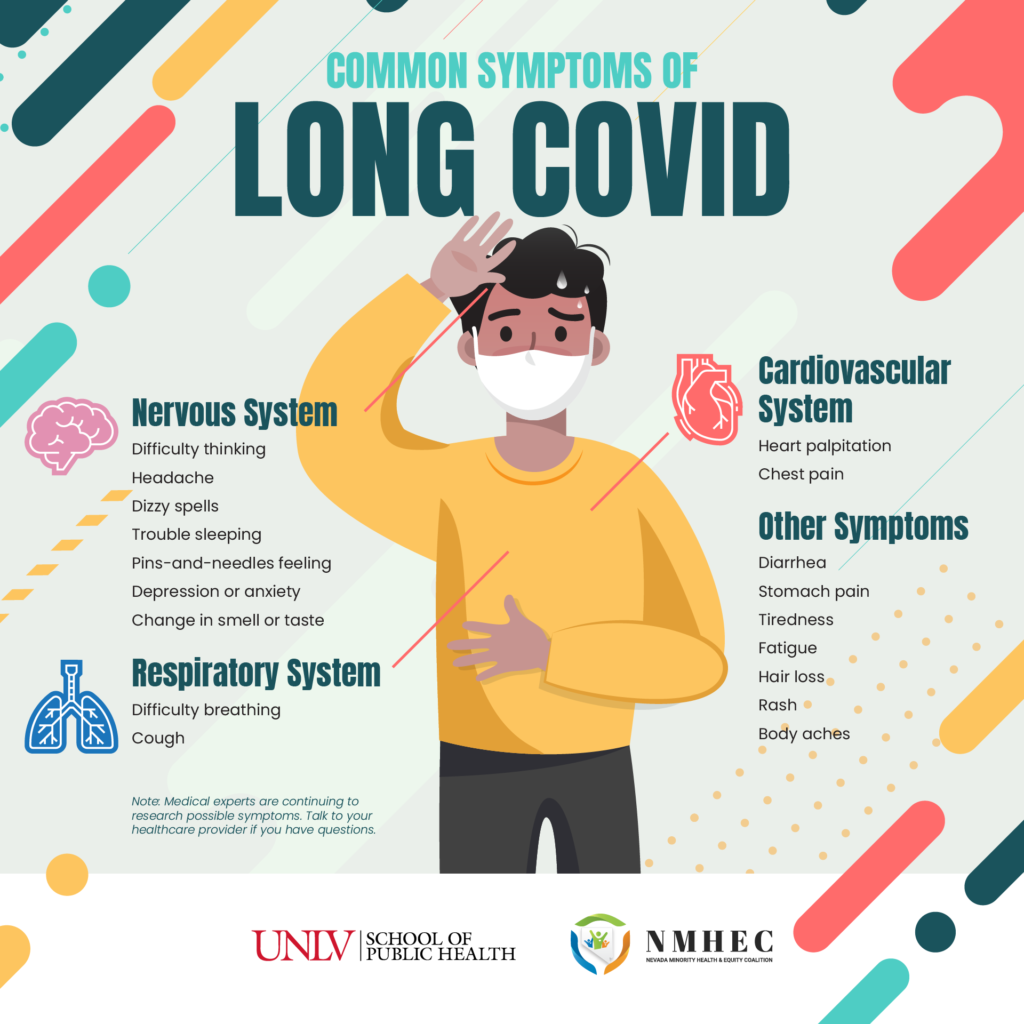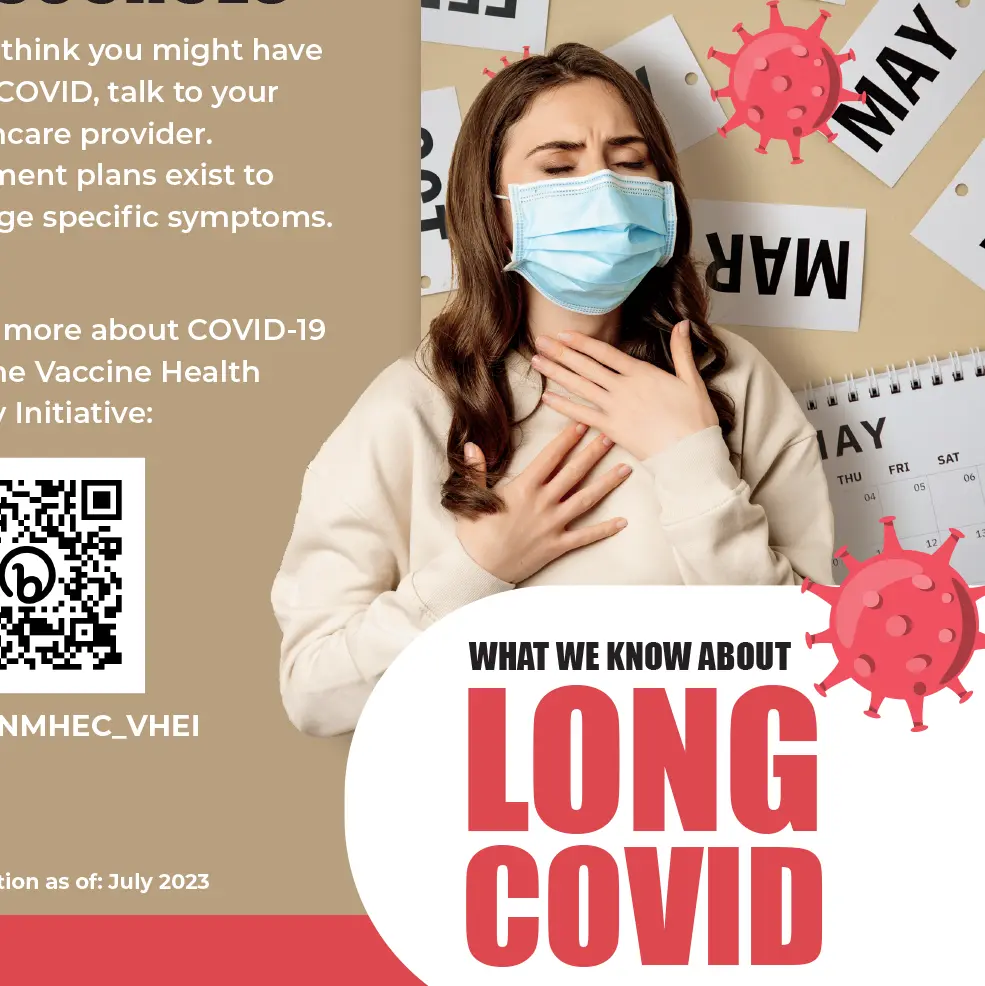Long COVID
Last updated: 9/10/23
Despite claims that the COVID-19 pandemic is over, people continue to get sick with COVID-19 every day (1). Furthermore, some people who were previously infected with COVID-19 have lasting effects that stay with them for weeks, months, or even years after the virus has been cleared from their bodies. This ailment is often referred to as Long COVID. Other names for Long COVID include long-haul COVID, post-COVID-19 conditions, chronic COVID, and post-acute sequelae of SARS-CoV-2 (PASC).
Between now and when COVID-19 was first identified in 2019, an estimated 65 million people around the globe have Long COVID, and this number is only predicted to increase (2). Long COVID can affect anyone who gets COVID-19, so here are some things you should know.
There is a broad range of Long COVID symptoms. These symptoms can be the same or different than those experienced during COVID-19 infection. In other words, some might see the same symptoms persist after the virus has been cleared from their bodies, while others develop new symptoms they did not experience beforehand.
Long COVID can range from mild to severe and can impact many areas of the body, including the heart, lungs, immune system, nervous system, and digestive system (2). Some common symptoms are:
- Fatigue
- Fever and chills
- Difficulty breathing, shortness of breath, and coughing
- Joint or muscle pain
- “Brain fog” (difficulty with thinking, concentrating, and remembering)
- Trouble sleeping
- Diarrhea
- Skin issues like rash or hair loss
Although anyone can get Long COVID, some people are more likely to develop it than others. People at higher risk are (3):
- Those who experienced severe COVID-19 illness (especially those hospitalized)
- Those with underlying health conditions like diabetes, asthma, an autoimmune disease, or obesity
- Those who did not receive a COVID-19 vaccine
- Those with multisystem inflammatory syndrome (MIS) during or after being sick with COVID-19
- Certain racial or ethnic minorities, due to health inequities
There is currently no cure for Long COVID. However, personalized treatment plans to help manage symptoms can be discussed with a healthcare provider. Because symptoms can be sorted into categories based on what body systems are affected, some specialists that people may see are pulmonologists, neurologists, gastroenterologists, and cardiologists (4). Treatment plans may include rehabilitation services, medications, and coordinated care.
The best way to prevent Long COVID is to avoid getting sick with COVID-19. To avoid getting sick, it is recommended that you:
- Stay up-to-date with your COVID-19 vaccines (5)
- Avoid close contact with anyone who is sick
- Wash hands often with soap and water for 20 seconds
- Avoid touching your eyes, nose, and mouth
- Clean and disinfect high-touch surfaces often (like door handles, light switches, and shared equipment)
Studies suggest that vaccination is associated with a reduced risk of developing long-term symptoms from COVID-19 as compared to those who are unvaccinated (6,7,8).
Learn more about COVID-19 vaccines: Covid-19 Vaccine | NMHEC
Check out our informational graphics:
- Centers for Disease Control and Prevention. COVID Data Tracker. CDC. Published July 29, 2023. Accessed August 8, 2023. https://covid.cdc.gov/covid-data-tracker/#datatracker-home
- Davis HE, McCorkell L, Vogel JM, Topol EJ. Long COVID: major findings, mechanisms and recommendations. Nat Rev Microbiol. 2023;21(3):133-146. doi:10.1038/s41579-022-00846-2
- NIH. Long COVID. National Institutes of Health | COVID-19 Research. Published June 2023. Accessed July 24, 2023. https://covid19.nih.gov/covid-19-topics/long-covid
- Katella K. What Happens When You Still Have Long COVID Symptoms? Yale Medicine. Published June 7, 2023. Accessed July 24, 2023. https://www.yalemedicine.org/news/long-covid-symptoms
- Centers for Disease Control and Prevention. Long COVID or Post-COVID Conditions. CDC. Published July 20, 2023. Accessed July 24, 2023. https://www.cdc.gov/coronavirus/2019-ncov/long-term-effects/index.html
- Azzolini E, Levi R, Sarti R, et al. Association Between BNT162b2 Vaccination and Long COVID After Infections Not Requiring Hospitalization in Health Care Workers. JAMA. 2022;328(7):676-678. doi:10.1001/JAMA.2022.11691
- Marra AR, Kobayashi T, Suzuki H, et al. The effectiveness of coronavirus disease 2019 (COVID-19) vaccine in the prevention of post–COVID-19 conditions: A systematic literature review and meta-analysis. Antimicrobial Stewardship & Healthcare Epidemiology. 2022;2(1):e192. doi:10.1017/ASH.2022.336
- Gottlieb M, Wang RC, Yu H, et al. Severe Fatigue and Persistent Symptoms at 3 Months Following Severe Acute Respiratory Syndrome Coronavirus 2 Infections During the Pre-Delta, Delta, and Omicron Time Periods: A Multicenter Prospective Cohort Study. Clinical Infectious Diseases. 2023;76(11):1930-1941. doi:10.1093/CID/CIAD045


